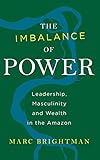The Imbalance of Power : Leadership, Masculinity and Wealth in the Amazon / Marc Brightman.
Material type: TextPublisher: New York ; Oxford : Berghahn Books, [2016]Copyright date: ©2016Description: 1 online resource (206 p.)Content type:
TextPublisher: New York ; Oxford : Berghahn Books, [2016]Copyright date: ©2016Description: 1 online resource (206 p.)Content type: - 9781785333095
- 9781785333101
- Akurio Indians
- Group identity -- Guiana
- Leadership -- Guiana
- Masculinity -- Political aspects -- Guiana
- Power (Social sciences) -- Guiana
- Trio Indians
- Wayana Indians
- SOCIAL SCIENCE / Anthropology / Cultural & Social
- amazonia
- american indian
- amerindian politics
- amerindian
- carib
- cultural anthropology
- cultural studies
- defying stereotypes
- differences between tribes
- egalitarian
- egalitarianism
- ethnographic
- europe
- european polity
- feminism
- feminist
- guiana
- harmonious with nature
- history
- indian stereotypes
- indigenous people
- native american
- patriarchy
- political ideologies
- social dynamic
- sociology
- state of nature
- tension
- unconventional
- united states history
- online - DeGruyter
| Item type | Current library | Call number | URL | Status | Notes | Barcode | |
|---|---|---|---|---|---|---|---|
 eBook
eBook
|
Biblioteca "Angelicum" Pont. Univ. S.Tommaso d'Aquino Nuvola online | online - DeGruyter (Browse shelf(Opens below)) | Online access | Not for loan (Accesso limitato) | Accesso per gli utenti autorizzati / Access for authorized users | (dgr)9781785333101 |
Browsing Biblioteca "Angelicum" Pont. Univ. S.Tommaso d'Aquino shelves, Shelving location: Nuvola online Close shelf browser (Hides shelf browser)

|

|

|

|

|

|

|
||
| online - DeGruyter Narratives in the Making : Writing the East German Past in the Democratic Present / | online - DeGruyter Sensitive Pasts : Questioning Heritage in Education / | online - DeGruyter War Stories : The War Memoir in History and Literature / | online - DeGruyter The Imbalance of Power : Leadership, Masculinity and Wealth in the Amazon / | online - DeGruyter Transnational Struggles for Recognition : New Perspectives on Civil Society since the 20th Century / | online - DeGruyter The Monumental Nation : Magyar Nationalism and Symbolic Politics in Fin-de-siècle Hungary / | online - DeGruyter Sustaining Russia's Arctic Cities : Resource Politics, Migration, and Climate Change / |
Frontmatter -- CONTENTS -- FIGURES, ILLUSTRATIONS AND TABLES -- ACKNOWLEDGMENTS -- A NOTE ON TRIO AND WAYANA LANGUAGE AND ORTHOGRAPHY -- ABBREVIATIONS -- MAPS -- INTRODUCTION -- Chapter 1 MAKING TRIO AND OTHER PEOPLES -- Chapter 2 HOUSES AND IN-LAWS -- Chapter 3 TRADE, MONEY AND INFLUENCE -- Chapter 4 MUSIC AND RITUAL CAPACITIES -- Chapter 5 OWNING PERSONS AND PLACES -- CONCLUSION Society Transcends the State -- GLOSSARY -- APPENDIX Trio Relationship Terminology -- REFERENCES -- INDEX
restricted access online access with authorization star
http://purl.org/coar/access_right/c_16ec
Amerindian societies have an iconic status in classical political thought. For Montaigne, Hobbes, Locke, Hume and Rousseau, the native American ‘state of nature’ operates as a foil for the European polity. Challenging this tradition, The Imbalance of Power demonstrates ethnographically that the Carib speaking indigenous societies of the Guiana region of Amazonia do not fit conventional characterizations of ‘simple’ political units with ‘egalitarian’ political ideologies and ‘harmonious’ relationships with nature. Marc Brightman builds a persuasive and original theory of Amerindian politics: far from balanced and egalitarian, Carib societies are rife with tension and difference; but this imbalance conditions social dynamism and a distinctive mode of cohesion. The Imbalance of Power is based on the author’s fieldwork in partnership with Vanessa Grotti, who is working on a companion volume entitled Living with the Enemy: First Contacts and the Making of Christian Bodies in Amazonia.
Mode of access: Internet via World Wide Web.
In English.
Description based on online resource; title from PDF title page (publisher's Web site, viewed 25. Jun 2024)


